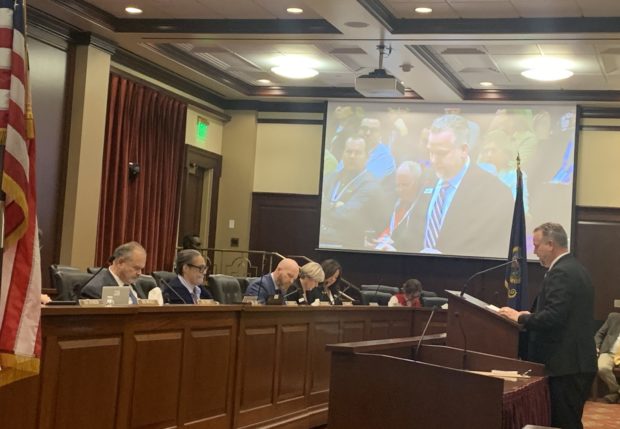
A bill outlawing sex education through fourth grade is headed to the Senate floor.
Voting along party lines, the Senate Education Committee endorsed Senate Bill 1071, which prohibits all instruction on “human sexuality, sexual orientation or gender identity” prior to fifth grade.
Debate over the bill centered on a 2020 report from Boise City Hall.
The bill’s sponsor, Sen. Ben Toews, R-Coeur d’Alene, again said he does not believe sex education is a rampant problem in the state’s grade schools. But Toews cited a study that urges the city of Boise to “collaborate” with the Boise School District to establish sex education as early as pre-K.
The report was written by Mayor Lauren McLean’s transition team shortly after her 2019 election.
Toews conceded he hadn’t talked to the school district about the report, and did not say school officials were involved in the matter. “I think it’s important to recognize that this is a goal of the city,” he said.
Longtime Boise trustee Nancy Gregory — in the committee room Monday for the Idaho School Boards Association’s annual “Day on the Hill” Statehouse lobbying events — said the district had nothing to do with the transition team’s report. She also said she has combed the district’s pre-K through fourth-grade curricula, and found no evidence of sex education in the documents.
Committee Democrats said the bill is unnecessary.
“I’m concerned that a whisper is being used to create legislation,” said Sen. Carrie Semmelroth, D-Boise.
Sen. Brian Lenney, R-Nampa, countered that sex education is embedded in school curriculum that embraces social-emotional learning.
“I would submit to everyone in this room that it is happening,” Lenney told an audience of close to 200 people, made up largely of elected trustees who belong to ISBA.
The committee passed the bill on a 6-2 vote. But while committee Chairman Dave Lent voted yes, he said he was worried that the bill suggests sex education is a widespread problem in grade schools. Lent, R-Idaho Falls, said he reserved the right to change his vote on the Senate floor.
That Senate vote could come in the next few days.
House bans use of student ID as voter identification
Voting along party lines, the House banned the use of student IDs as a form of voter identification.
“Voting is serious business, with serious consequences,” said Rep. Tina Lambert, R-Caldwell, making a brief case for House Bill 124.
If the bill becomes law, students could still vote by using one of several forms of ID already allowed under state law: a driver’s license, a passport, a tribal ID, a concealed-carry permit, or an ID card issued by the Idaho Transportation Department.
That latter form of ID — and its $15 cost — was a sticking point during Monday’s abbreviated debate.
Rep. John Gannon, D-Boise, said requiring students to buy an ID card amounted to an unconstitutional poll tax. He urged lawmakers to hold off on passing HB 124, until lawmakers could pass a separate bill establishing a new, free ID card.
“There is a fix in another bill that’s coming along,” Gannon said.
Lawmakers were unmoved.
Monday’s 59-11 House vote sends the bill to the Senate.
Idaho School Boards Association hosts Day on the Hill event
School board trustees gathered in Boise Monday for Day One of the annual Day on the Hill event — a two-day opportunity for education leaders to discuss pressing legislative issues and connect with lawmakers.
School board members roamed the Statehouse, and gathered at the Grove Hotel for networking sessions and workshops.
ISBA hosted a panel discussion in the afternoon between some of Idaho’s top education stakeholders:
- Debbie Critchfield, superintendent of public instruction.
- Matt Freeman, executive director, State Board of Education.
- Andy Grover, executive director, Idaho Association of School Administrators.
- Matt Compton, associate executive director, Idaho Education Association.
- Matthew Reiber, education policy adviser for Gov. Brad Little.
- Blake Youde, lobbyist, Idaho Charter School Network.
Panelists discussed school choice and public education funding, and identified which education topics receive too much attention and which are underrepresented in legislative conversations. They also advised the crowd of around 200 on how to talk to lawmakers about the good things happening in their districts, as well as their needs.
The panelists agreed that conversations about social issues — CRT, social emotional learning, topics of gender, indoctrination — tend to distract from the real needs of schools.
“We spent a lot of time … questioning whether or not something that has been portrayed on national news (is) happening here,” said Critchfield. “And most of the time, it is not.”
Reiber echoed the superintendent’s comments. “It’s taking a lot of air out of the room.”
Instead, the panelists said lawmakers should focus on more pressing needs, like school facilities, K-3 literacy rates, go-on rates and student preparedness, local school district control and restoring respect for educators.
And the panelists also said public schools should “reclaim” the school choice narrative. Parents have a lot of existing choices within the public school system, and districts can authorize charters or partner with programs to expand choice for local families. Legislators need to hear those stories, the panelists agreed.
After concluding the one-hour discussion, the Day on the Hill attendees walked to the Statehouse to sit in on Senate Education’s meeting.
